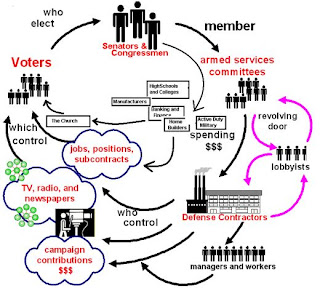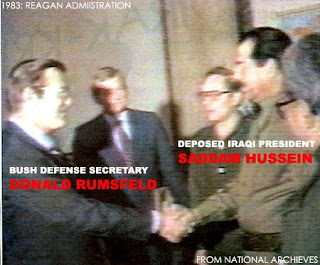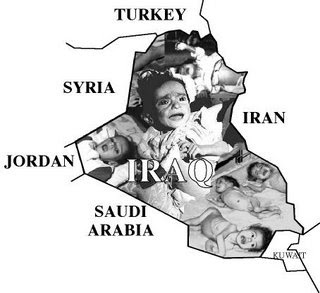As Iran continues to say it is developing nuclear enrichment for power supply and not weaponry. This has caused great tension for the United States, which perceives Iran acquiring such weaponry a threat to the stability of the world. Yet of recently there is a similar sanction as one in Saddam's Iraq in Iran. This is once again causing varying degree of pressure on Iran. yet, it does seem that Iran wants to negotiate with America.
"The countries(Iran and US)were meeting in Istanbul in an attempt to find common ground at talks jeopardized by Tehran's refusal to discuss demands that it curb nuclear activities that could manufacture the fissile core of nuclear warheads(haaertz.com)."
As you can see there are talks between Iran and western powers to negotiate.
http://www.haaretz.com/news/international/u-s-we-are-willing-to-engage-iran-but-we-are-realistic-1.338480
The policies America has towards the Middle East greatly affect its' own domestic policy and the international environment. This blog will provide impartial facts for you to analyze in order to judge American policy towards the Middle East.
Friday, January 21, 2011
The Movie "The Politics of Fear"


This movie is also quite relevant in interpreting Middle Eastern affairs better. It shows the the rise of the Neo-cons and America's strong involvement in Middle Eastern affairs. This also debunks myths ordinary Americans have developed through the media and political rhetoric.
Who are the Neo-Cons:
"Neoconservatism is version of Conservatism in the United States which supports using American economic and military power to bring democracy, and human rights to other countries(weeklystandard.com)."
In the movie the Neoconservative are analyzed on how they first initiated and how they have had tremendous affect on American policy.The Neocons believe in a fantasy that, first conceptualized by Leo Strauss, that America had a special destiny in the world, to fight evil and bring democracy in the world.His idea was such radical that he believed it was okay to even fabricate the truth in order to mobilize the public to pursue military action. Thus many political rhetoric are fabricated especially dealing with the Iraqi war. One such myth manipulated by politicians was Iraq was involved in the the 9/11 plot. However, after investigation, no such evidence is received if Iraqi involvement.
Who are the Neocons"
Ronald Reagon
George W. Bush
Donald Rumsfield
Source:
http://www.weeklystandard.com/Content/Public/Articles/000/000/003/000tzmlw.asp
The movie "Why We Fight"

The movie "Why We Fight" portrays a major reason why America has been involved in a great number of wars in the recent century. From the Vietnam war to the current Iraq war, we are always involved in some military actions. Throughout America's early history there were not any standing army. Many of the founding fathers distrusted standing armies. However, after world war two and the rise of soviet communism led to a permanent military of the United States. in the movie it portrays how the military industrial complex dominates American policies. The MIC and it wanted to derive profit can be seen as major reason why we see an increasing tension and war around the world, especially in the middle east.
Iraq War

What are the true reasons America has repeatedly used military force in the Middle East.
The recent justification "former British Prime Minister Tony Blair today maintained for the 2003 invasion of Iraq" was "on the grounds that the Hussein regime might have resumed producing weapons of mass destruction if the potential for military action was removed(globalsecurity.com)." As you can see the number one justification given by politician to invade Iraq was they have possession of Weapons of Mass destruction. Yet, the global security is stated in their website "no evidence of active unconventional weapons programs or working stockpiles has turned up in Iraq in the years following the invasion."
From the website commondreams.org and the movie "why we fight" a more controversial prospective on the motive of the war is shown. In the Commondreams.org website it states "briefly, we went to war with Iraq because an influential group of conservatives (now known as "neo-cons") convinced President George W. Bush that it was in America's best interests to conquer Iraq as a first step toward dominating the oil-producing nations in the Middle East and eventually the world."
Source:
http://www.globalsecuritynewswire.org/gsn/nw_20110121_5665.php
http://www.commondreams.org/views04/0913-03.htm
Thursday, January 20, 2011
American Sanctions Towards M.I Countries

Whenever America was threatened by a Middle Eastern country America pressured that country into submission.One method America uses to pressure countries are by imposing sanctions. The effects of sanctions have varying degree of effects in different countries and in different areas of these countries. Two of the most recent American sanctions whose effects have been studied are the sanctions against Iraq and Iran.
Iraqi Sanctions
Pressure Iraq into complying to end the programs to create weapons of mass destruction.
Death of half a million Iraq Children due to not Iraq sanctioning causing a paucity in medicine and medical equipment.
When asked on US television if she [Madeline Albright, US Secretary of State] thought that the death of half a million Iraqi children [from sanctions in Iraq] was a price worth paying, Albright replied: “This is a very hard choice, but we think the price is worth it(Globalissues.org).”
Direct Effects
Decreased Imports
Medicines
Food Imports
Agricultural Inputs - fertilizer, pesticides, spare parts
Industrial/Commercial
Decreased Exports
Impact on export earnings, access to foreign currency, etc.
Short Term Effects
Deterioration in health status;
Increased: Morbidity and mortality (esp. child),Maternal and perinatal [sic] mortality,
Low-birth-weight babies, Infectious diseases, Epidemics, Malnutrition;
Deterioration in water quantity and quality;
Deterioration in health services;
Decrease in available medicines, vaccines laboratory and diagnostic tests;
Breakdown of medical, Xray, lab equipments.
Economics
Decreased export earnings;
Decreased trade leading to closure of business and industry;
Inflation;
Unemployment;
Long Term Effects
Reduction in the overall (general) health status of the population
Deterioration in health services and diminished [sic] national capacity to provide care;
Loss of previous gains in preventive and curative care services;
Resurgence of illness and disease associated with poverty (e.g. epidemics, infectious disease)
Economic
Chronically decreased economic activity;
Decline in revenue from all sources;
Decline in GDP, GNP, per capital income;
Loss of trade partners, regional/international trade interests;
Chronically high unemployment
Collapse of public and private infrastructure
Decline in public education.
Source(Especially the effects of the sanctions are derived from the website: http://www.globalissues.org/article/105/effects-of-sanctions which also sourced the info to The Impact of Sanctions: A Study of UNICEF’s Perspective, Table 3, Eric Hoskins, MD Consultant, UNICEF New York February 1998)
Subscribe to:
Posts (Atom)